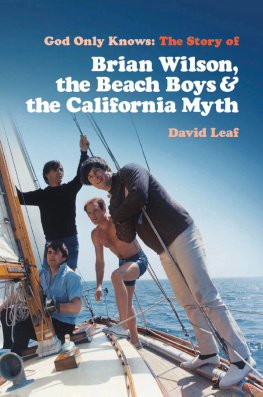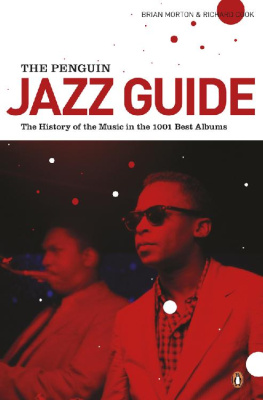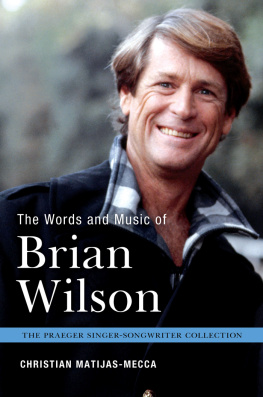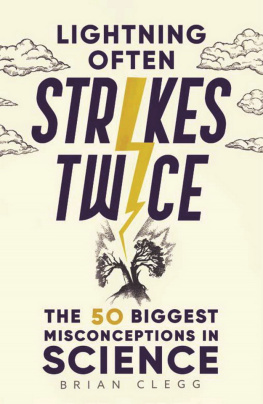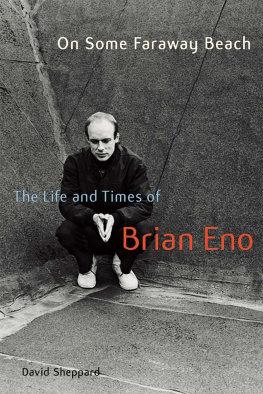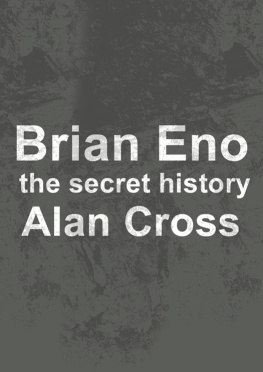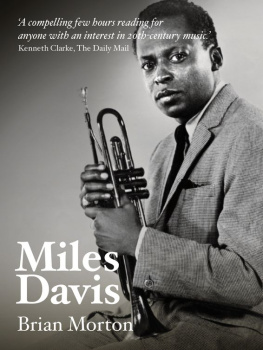David Sheppard - On Some Faraway Beach: The Life and Times of Brian Eno
Here you can read online David Sheppard - On Some Faraway Beach: The Life and Times of Brian Eno full text of the book (entire story) in english for free. Download pdf and epub, get meaning, cover and reviews about this ebook. year: 2008, publisher: Orion, genre: Non-fiction. Description of the work, (preface) as well as reviews are available. Best literature library LitArk.com created for fans of good reading and offers a wide selection of genres:
Romance novel
Science fiction
Adventure
Detective
Science
History
Home and family
Prose
Art
Politics
Computer
Non-fiction
Religion
Business
Children
Humor
Choose a favorite category and find really read worthwhile books. Enjoy immersion in the world of imagination, feel the emotions of the characters or learn something new for yourself, make an fascinating discovery.

- Book:On Some Faraway Beach: The Life and Times of Brian Eno
- Author:
- Publisher:Orion
- Genre:
- Year:2008
- Rating:3 / 5
- Favourites:Add to favourites
- Your mark:
- 60
- 1
- 2
- 3
- 4
- 5
On Some Faraway Beach: The Life and Times of Brian Eno: summary, description and annotation
We offer to read an annotation, description, summary or preface (depends on what the author of the book "On Some Faraway Beach: The Life and Times of Brian Eno" wrote himself). If you haven't found the necessary information about the book — write in the comments, we will try to find it.
David Sheppard: author's other books
Who wrote On Some Faraway Beach: The Life and Times of Brian Eno? Find out the surname, the name of the author of the book and a list of all author's works by series.
On Some Faraway Beach: The Life and Times of Brian Eno — read online for free the complete book (whole text) full work
Below is the text of the book, divided by pages. System saving the place of the last page read, allows you to conveniently read the book "On Some Faraway Beach: The Life and Times of Brian Eno" online for free, without having to search again every time where you left off. Put a bookmark, and you can go to the page where you finished reading at any time.
Font size:
Interval:
Bookmark:
For Louise and my parents

Im indebted to Michael OConnell for his genially disguised assiduousness and rounds of the black stuff, to Ian Preece for much the same, to Stephen Fall for his scrupulousness and to Louise Clarke for her patience and British remedies.
Thank you to Brian Eno for his co-operation and to everyone else who agreed to the grand inquisition, especially:
Gavin Bryars
Harold Budd
David Byrne
John Cale
Tim Clark
Dave Coppenhall
Sarah Eno
David Enthoven
Bryan Ferry
John Foxx
Fred Frith
Robyn Hitchcock
Chris Hobbs
James Johnson
Russell Mills
Colin Newman
Tom Phillips
Achim Roedelius
Howard Skempton
Chris Spedding
Lloyd Watson
Robert Wyatt
Thanks for letting me darken your inboxes:
Alfreda Benge
Roger Eno
Chris Frantz
Robert Fripp
Jane Geerts
Daniel Lanois
Phil Manzanera
Kris Needs
Judy Neiland
Richard Williams
Im indebted to the following for their recollections, advice, research material, interlocution and inspiration:
Pete Astor
Mark Blake
Mark Brend
Michael Brook
Paul Buchanan
Chris Carr
Geoff Dolman
Hannah Eno
Darren Hayman
Martin and Lene Holm
Mark Howard
Paul Lambden
Graham Lovatt and his Rockular Archive
Keiron Phelan
Sylvie Simmons
Tom Verlaine
Peter Wix
Special thanks to Anthea Eno for her memories, objectivity and assistance beyond the call.
My gratitude to all the other (sometimes inadvertent) interviewees, correspondents and commentators who helped shed some light.
Author photograph by Peter Wix
It is better to have enough ideas for some of them to be wrong than to be always right by having no ideas at all. (Edward de Bono)
Rock stars; is there anything they dont know? (Homer Simpson)
You couldnt make him up. Or at least if you did no one would quite believe you. The polymorphous Brian Eno has been so many things over forty years of creative endeavour that its sometimes difficult to reconcile this inimitable sexagenarians disparate enthusiasms and achievements; harder still, these days, to succinctly define exactly what it is he does. Indeed, Eno himself long ago gave up trying to do that. Bored with having to reel off the worlds most bafflingly convoluted job description (record-producer-cum-experimental-musician-cum-visual-artist-cum-epistemologist-cum-belle-lettrist-cum-one-man-think-tank-cum-parfumeur, and so on ), he took to telling interested strangers that he was in fact an accountant; an admission guaranteed to thicken the ice at parties.
A dissection of Enos life necessarily throws up a portrait in mosaic a pixellated image glinting with apparent paradoxes. Consider the contradictory Brians: the 1970s rock lust-object with a predilection for logarithm tables; the technophile who never learned to drive; the bon vivant who likes to be at work before sunrise; the non-musician with a sublime gift for melody; the uxorious family man and self-confessed flirt, the visceral sensualist and cerebral conceptualist (and, lest it be forgotten, the avant-garde champion who took a U(2)-turn to refurbish the worlds least arty rock band). If you were a method actor asked to inhabit the character of Brian Eno, where would you start? Even his full name Brian Peter George St. Jean le Baptiste de la Salle Eno sounds like a case of raging multi-personality syndrome (if not the punch-line to an esoteric, ecumenical gag). That grandiloquent moniker turns out to be a slight affectation (the residue of an otherwise sloughed-off Catholic education), its retention proof that Brian cleaves to the exotic in the everyday. Its perhaps that characteristic above all others which binds his many, seemingly incongruent predispositions.
It was as the very personification of exotica that Brian Eno first parachuted into the wider public consciousness in 1972 a startling, hermaphrodite apparition even among the glittering mannequin retinue that was Roxy Music. Resplendent in outlandish couture and framed against his futuristic paraphernalia of synthesizers and whirring tape recorders, from the off, Eno seemed like a figure untethered from musical precedent. He has continued ever since to describe a sinuous career trajectory, the guidelines for which if there are any are known to him alone. He remains singular within the realm of music and while Eno-esque is an adjective often appended to aspects of other artists work, no succeeding generation has produced a new Eno in the way that a new Dylan has been regularly thrown up by the cycling tides of musical fashion.
While Eno may be a happy anachronism, his musical influence remains pervasive palpable whenever an ambient backdrop, plunderphonic vocal sample or world music hybrid comes into earshot; or whenever rock dispenses with blues-based worthiness and embraces the bolder tenets of art. Over and above his headline-grabbing work with David Bowie, Talking Heads, U2, Devo, James, Paul Simon, Coldplay et al, traces of the Eno artistic genome continue to suffuse popular music, identifiable in everything from the abstract meta-rock of Radiohead and Mobys dance-pop audio piracy to the glam hauteur of Franz Ferdinand and the micro-processed glitch-scapes of Autechre. Moreover, Enos overarching ideas about the production, function and dissemination of music have trickled down so effectively that they now inform the sonic vocabulary of our age.
Enos has been a Zelig-like presence on the musical landscape for well over three decades now, his influence publicly acknowledged by a dizzying panoply of artists from Prince to Public Enemy, Cabaret Voltaire to Aphex Twin. The instigator of ambient and generative musics, Eno was also there or thereabouts when glam rock first preened, prog first lumbered, punk first raged; post-punk first itched, disco first strutted and world music first hybridized. Yet he has always orbited epicentres of change, rarely touched down in them the looker-on knowing more of the game. Too judicious to be sucked into progs baronial excesses, too much of a pop connoisseur to wield punks year-zero bludgeon, he was feted by fans of both genres nonetheless, although he has always been happiest carving a new route through the creative landscape and is by his own admission a better explorer or more accurately a surveyor than he is a settler.
His nose for the zeitgeist is demonstrable, however; tenures in London, New York, Berlin and St. Petersburg all pre-empted, or at least coincided, with those cities enjoying a moment of energized artistic pre-eminence. Moreover and more significantly for the biographer to trace the arc of Enos creative career is to follow the forty-year parabola of Western cultural evolution itself. Inspired by post-war avant-gardism, granted licence by the liberated 1960s, embraced by the revolutionary 70s, consecrated by the technocratic, cross-pollinated 80s and 90s, forced to diversify laterally by the ambiguous 00s; youve long been able to set your socio-cultural alarm clock by Brian Eno.
Renaissance Man is a label tossed out all too glibly when multitasker would be more accurate, but in Brian Enos case it is, for once, a not entirely spurious description (although his detractors tend to use a more pejorative adjective, dilettante). While none of his innate gifts mark him out as a genius per se (He wasnt Leonardo da Vinci or anything, his friend and art school mentor, the painter Tom Phillips, insisted to me, but he obviously had an inventive mind, as everybody now knows), there is nonetheless something of the late medieval polymath about Brian Eno, albeit cut with a very mid-20th-century strain of British garden shed amateurism. Part artist, part scientist, part societal weather forecaster (or futurologist as the trendy neologism has it), labouring over infinitesimal creative detail while simultaneously prescribing any number of grand, socio-technological hypotheses, he is inquisitiveness personified and continues to pack notebooks with theorems, diagrams, observations, formulae, jokes, aphorisms and sketches, and latterly oscillates between art, music, sciences and politics with, whatever Tom Phillips says, an almost Da Vincian versatility.
Next pageFont size:
Interval:
Bookmark:
Similar books «On Some Faraway Beach: The Life and Times of Brian Eno»
Look at similar books to On Some Faraway Beach: The Life and Times of Brian Eno. We have selected literature similar in name and meaning in the hope of providing readers with more options to find new, interesting, not yet read works.
Discussion, reviews of the book On Some Faraway Beach: The Life and Times of Brian Eno and just readers' own opinions. Leave your comments, write what you think about the work, its meaning or the main characters. Specify what exactly you liked and what you didn't like, and why you think so.


